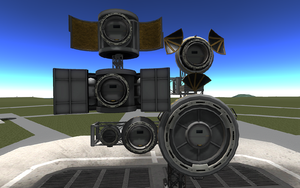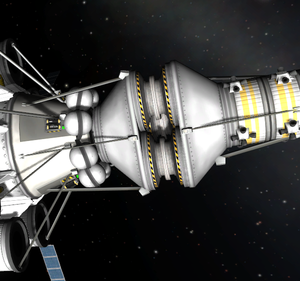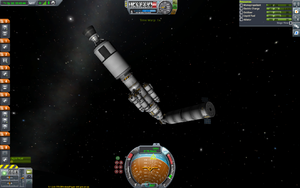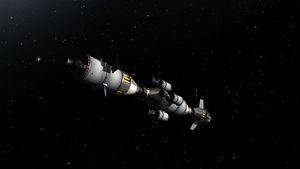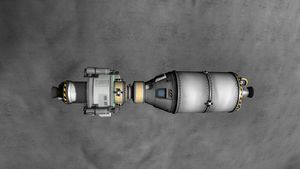Difference between revisions of "Docking"
m (→Using the docking controls) |
Odin Wülser (talk | contribs) (Added Space Stations) |
||
| (74 intermediate revisions by 44 users not shown) | |||
| Line 1: | Line 1: | ||
[[File:Gemini-fuel-exchange.jpg|thumb|right|300px|Two docked ships exchanging fuel]] | [[File:Gemini-fuel-exchange.jpg|thumb|right|300px|Two docked ships exchanging fuel]] | ||
| − | Docking was officially introduced in KSP 0.18 and allows separate ships to join into a single entity that is controlled as one and allows the transfer of resources | + | '''Docking''' was officially introduced in KSP 0.18 and allows separate ships to join into a single entity that is controlled as one and allows the transfer of resources and [[Kerbonaut]] between connected modules. |
| + | |||
| + | To get close enough to even consider docking, you'll need to perform an [[orbital rendezvous]]. | ||
== Using the docking controls == | == Using the docking controls == | ||
| + | [[File:Docking Nodes.png|thumb|Available docking ports]] | ||
| + | [[File:Docking lin.png|thumb|Specialised docking controls, although they are not required to dock]] | ||
| + | |||
| + | The grey button around the bottom left corner of the screen (just below the green staging button, and above the blue map button) sets your ships into docking mode. In docking mode your main engines are shut off and your normal WASD controls map to [[RCS]] translation maneuvers instead. This mode requires that the craft is fitted with RCS (or it will do nothing). | ||
| + | |||
| + | To dock with a nearby object (see [[Tutorial:Orbital Rendezvous]] or [[Basic Maneuvers#Docking / Rendezvous|the basic maneuvers page]] for how to rendezvous with another object in orbit), start by rotating your ships so their docking ports are facing each-other. Remember to toggle any docking-port covers if necessary. Also keep an eye out for how your ships will connect and make sure you won't run into solar panels or other modules on your approach. | ||
| + | |||
| + | Right click the docking port on your ship and hit "control from here". Now activate docking mode. What is happening now is that docking port will be seen as the "center" of your ship. Activate RCS (the default key is {{Key press|R}}) and the controls will be very similar to the EVA controls. {{Key press|W}}{{Key press|S}} will be used to move forward and backwards, {{Key press|A}}{{Key press|D}} will be used to move left and right, {{Key press|Shift}} and {{Key press|Ctrl}} will be used to move up and down. | ||
| − | The | + | Once your docking ports are very close (or touching) they will magnetically clamp to each-other and you will have successfully docked. The tolerance for the clamps is quite generous, however, it can take some time for it to kick in - so once you get your ports in close proximity, just wait a bit before trying to get any closer (and possibly damage your ships). If your ports stick together, but don't actually dock, try turning the SAS off: it might be preventing your ship from turning a crucial few degrees. |
| − | + | Note that you don't have to be in docking mode to dock - if you manage to align your docking ports using the regular controls, everything will still work. There are also special key bindings for translation in staging mode: {{key press|I}}{{key press|K}} for up and down, {{key press|J}}{{key press|L}} for left and right, and {{key press|H}}{{key press|N}} for forward and back. | |
| − | + | While docked, you can transfer resources (fuel, etc.) by clicking on a tank, and then {{Key press|[[Mod]]|right click}} on another target and pressing the desired In/Out switches of the windows that pop up. | |
| − | + | The Kerbanauts may be transferred manually using EVAs, or using [[Crew#Crew transfer|crew transfer]]. | |
| − | + | To undock simply right click either of the docking clamps and click undock. In order to facilitate separation, the magnetic clamping feature is turned off when undocking is executed. Once the ships have separated (about 5-10m) the magnetic clamping feature will automatically reset. | |
| − | + | Note that docking mode isn't required for docking on the PC version, however it is required on the Console version of KSP. | |
| − | + | === Docking ports === | |
| + | There are seven docking ports available for different sizes and docking directions. In order to dock two spacecraft, both must be equipped with docking ports of equal size. When constructing a spacecraft, another part which is not a docking port can be placed on it. That part can then be undocked, but not redocked. This is a '''common mistake''' for beginners! | ||
| − | + | * [[Clamp-O-Tron Jr.]] is the [[radial size|tiny]] port. | |
| + | * [[Inflatable Airlock]] (DLC), when opened, can function as a tiny port. | ||
| + | * [[Clamp-O-Tron Docking Port]] is the small port. | ||
| + | * [[Clamp-O-Tron Sr. Docking Port]] is the large port. | ||
| + | * [[Clamp-O-Tron Shielded Docking Port]] is a small port (compatible with the Clamp-O-Tron Docking Port) covered by a retractable shield. This protects the port from atmospheric friction. The port's cover must be opened before it can be used for docking. | ||
| + | * [[Inline Clamp-O-Tron]] is a small port mounted within a recessed bay in a 1.25m cylindrical fuselage. This allows the port to be hidden within a stack of [[Radial size|small]] parts. The port's cover must be opened before it can be used for docking. | ||
| + | * [[Mk2 Clamp-O-Tron]] is a small port mounted within a recessed bay in a Mk2 fuselage. It is the [[Radial size|Mk2]] version of the Inline Clamp-O-Tron. | ||
== Multi-port docking == | == Multi-port docking == | ||
[[File:Triple-docking.png|right|thumb|A triple-connection between two sections of a large vessel]] | [[File:Triple-docking.png|right|thumb|A triple-connection between two sections of a large vessel]] | ||
| − | Unfortunately, docking ports are not very rigid. This makes | + | Unfortunately, docking ports are not very rigid. This makes craft which consist of multiple large sections very difficult to control. To mitigate this problem, you can use bi- or tri-couplers to mount multiple docking ports. The resulting multi-part connection is a lot more stable. Unfortunately docking these craft is even more difficult than docking with a single-port connection, because now you also have to take care of the rotation of your craft. Otherwise it can happen that only one port connects. Should this happen, undock your craft and try again. Sometimes when using tri-couplers, it can happen that even though the orientation is perfect, only two ports are actually connected. You can tell by right-clicking the ports. When none of two ports has an "undock" option, they are not actually connected. This problem can be solved by going to the space center and reloading the ship. |
| + | |||
| + | Additionally, it is recommended to control a multi-part craft from the command pod closest to the center of mass of the whole contraption. In that case the direction on the [[navball]] is affected the least by the ends of the craft wobbling around. | ||
| + | |||
| + | Alternatively, since {{version|0.20}}, [[Clamp-O-Tron Sr. Docking Port]]s have become a better way of keeping two large ships together than triple docking small [[Clamp-O-Tron Docking Port]]s, seeing as they cover the same area, but only need one attempt to completely dock together. However, docking together several very, VERY large ships together will require using several Clamp-O-Tron Sr. Docking Port anyway. Keep in mind larger ships will increase part count, and lag as a consequence. | ||
| + | |||
| + | It is possible to establish a multi-port connection without using a multi-coupler, but great care must be taken in the [[VAB]] when manually placing ports for this purpose. | ||
| − | + | Also, for building large ships with parallel side-mounted tanks, multiple docking ports along the side of the tanks can be used to attach the incoming tanks to the sides of the ship. The easiest way to guarantee the ports are in identical locations is to place two rings of ports on a generic part in the VAB and use that part for both the center stack and the incoming side tank. This way the docking ports will be in identical spots. However, since the docking angle is even more critical in this situation, using a mod such as NavyFish's [https://forum.kerbalspaceprogram.com/index.php?/topic/40423-181-docking-port-alignment-indicator-version-685-updated-121419/ Docking Port Alignment Indicator] is necessary to guarantee there is zero rotation on the ports. | |
== Possibilities for docking == | == Possibilities for docking == | ||
| − | + | Various new abilities arose with the introduction of docking. | |
| − | |||
=== In-orbit refueling === | === In-orbit refueling === | ||
| + | [[File:orbital_refuelling.png|right|thumb|A heavy ship refuels in orbit.]] | ||
| + | A large rocket, such as an interplanetary rocket, may run out of fuel before leaving Kerbin's sphere of influence. When this happens, some tankers can be sent into orbit, dock and then transfer fuel from the tanker to the rocket. In order to start the refueling {{Key press|[[Mod]]|right click}} must be pressed on the two tanks that should send/receive fuel, and click on the appropriate panel that appears. | ||
| − | + | If you need to refuel frequently, you may consider building a large orbital tanker, or a space station with one. | |
| − | |||
| − | |||
=== In-orbit spacecraft assembly === | === In-orbit spacecraft assembly === | ||
| − | [[File:Docked-craft.jpg|right|thumb| | + | [[File:Docked-craft.jpg|right|thumb|A 3-component ship in low kerbin orbit]] |
| − | There is a limit of how large | + | There is a limit of how large rockets can be built in the Vehicle Assembly Building. What does one do to fix this? Dock multiple craft together to create a larger rocket! |
| + | The cancelled Constellation program by NASA was planning to use this method for manned missions to the Moon and Mars.<ref>[[w:Constellation program|Constellation program]] of NASA</ref> | ||
| − | + | Note though that currently (as of 0.90) docking connectors are a bit wobbly, so ships from too many too heavy components will be hard to control. Docking ports can even rip off when put under too much stress. This problem can be mitigated by using multiple docking ports on bi- or tri-couplers (see above). A mod which offers a different workaround for this problem is the [http://forum.kerbalspaceprogram.com/index.php?/topic/152797-121-quantumstrutscontinued-magical-struts-for-rigidifying-outside-the-vab/ Quantum Strut mod]. Or, one can use [[time warp]] to force-stop all rotation, wobbling, and such. Note, this may not work every time. | |
| − | + | === Detachable landing craft === | |
| + | [[File:Docked-lander.jpg|right|thumb|A vessel with a detachable lander]] | ||
| + | This method was used during the human moon landings,<ref>[[w:Apollo program#Lunar mission profile|Apollo program]] of NASA</ref> and it can be equally useful for the Kerbal. When you do a landing mission and have the intention of getting back to Kerbin, don't take all the fuel for the return flight to the surface of whatever planet you are visiting. Undock a lander with just enough fuel to get to the surface and back, and redock it with the return stage when it's back in orbit. You can save a lot of fuel that way, because the lander doesn't need to carry all the return fuel to the surface and back into orbit. | ||
| − | === | + | === Space Stations === |
| − | [[ | + | Space Stations can be assembled by docking multiple modules in Orbit. Space Stations can be used to farm Science, using the [[Mobile Processing Lab MPL-LG-2]], refuel vessels, refine ore or leveling up crew. But most Space Stations are purely for the astetic and fun of building such a large structure. In [[Career Mode]] there are also contracts that require you to build a Space Station, or expand a existing one. |
| − | |||
=== Small in-game computer systems === | === Small in-game computer systems === | ||
| − | Docking Ports can also be used to create limited orbital computers. <ref> | + | Docking Ports can also be used to create limited orbital computers.<ref>“[[thread:24820|KSP computer dev team]]” in the forums</ref> |
| − | + | ||
| + | == Asteroid capture == | ||
| + | {{See also||[[Asteroid#Capturing asteroids|Capturing asteroids]] section in asteroid article}} | ||
| + | Capturing [[asteroid]]s is similar to docking, with only a few differences. Because an [[Advanced Grabbing Unit]] can be used on an asteroid, it can connect from any direction and does not require a counterpart. However, an asteroid can't maneuver on its own. Attaching small RCS pods to the asteroid is one of many solutions to this problem. An asteroid cannot be captured using a docking port. | ||
| + | |||
| + | == See also == | ||
| + | * [[Tutorial:Basic Docking|Basic Docking]] tutorial | ||
| + | |||
| + | == References == | ||
| + | <references /> | ||
| + | |||
| + | [[Category:Maneuvers]] | ||
Latest revision as of 15:37, 24 September 2024
Docking was officially introduced in KSP 0.18 and allows separate ships to join into a single entity that is controlled as one and allows the transfer of resources and Kerbonaut between connected modules.
To get close enough to even consider docking, you'll need to perform an orbital rendezvous.
Contents
Using the docking controls
The grey button around the bottom left corner of the screen (just below the green staging button, and above the blue map button) sets your ships into docking mode. In docking mode your main engines are shut off and your normal WASD controls map to RCS translation maneuvers instead. This mode requires that the craft is fitted with RCS (or it will do nothing).
To dock with a nearby object (see Tutorial:Orbital Rendezvous or the basic maneuvers page for how to rendezvous with another object in orbit), start by rotating your ships so their docking ports are facing each-other. Remember to toggle any docking-port covers if necessary. Also keep an eye out for how your ships will connect and make sure you won't run into solar panels or other modules on your approach.
Right click the docking port on your ship and hit "control from here". Now activate docking mode. What is happening now is that docking port will be seen as the "center" of your ship. Activate RCS (the default key is R) and the controls will be very similar to the EVA controls. WS will be used to move forward and backwards, AD will be used to move left and right, ⇧ Shift and ^ Ctrl will be used to move up and down.
Once your docking ports are very close (or touching) they will magnetically clamp to each-other and you will have successfully docked. The tolerance for the clamps is quite generous, however, it can take some time for it to kick in - so once you get your ports in close proximity, just wait a bit before trying to get any closer (and possibly damage your ships). If your ports stick together, but don't actually dock, try turning the SAS off: it might be preventing your ship from turning a crucial few degrees.
Note that you don't have to be in docking mode to dock - if you manage to align your docking ports using the regular controls, everything will still work. There are also special key bindings for translation in staging mode: IK for up and down, JL for left and right, and HN for forward and back.
While docked, you can transfer resources (fuel, etc.) by clicking on a tank, and then Mod+right click on another target and pressing the desired In/Out switches of the windows that pop up.
The Kerbanauts may be transferred manually using EVAs, or using crew transfer.
To undock simply right click either of the docking clamps and click undock. In order to facilitate separation, the magnetic clamping feature is turned off when undocking is executed. Once the ships have separated (about 5-10m) the magnetic clamping feature will automatically reset.
Note that docking mode isn't required for docking on the PC version, however it is required on the Console version of KSP.
Docking ports
There are seven docking ports available for different sizes and docking directions. In order to dock two spacecraft, both must be equipped with docking ports of equal size. When constructing a spacecraft, another part which is not a docking port can be placed on it. That part can then be undocked, but not redocked. This is a common mistake for beginners!
- Clamp-O-Tron Jr. is the tiny port.
- Inflatable Airlock (DLC), when opened, can function as a tiny port.
- Clamp-O-Tron Docking Port is the small port.
- Clamp-O-Tron Sr. Docking Port is the large port.
- Clamp-O-Tron Shielded Docking Port is a small port (compatible with the Clamp-O-Tron Docking Port) covered by a retractable shield. This protects the port from atmospheric friction. The port's cover must be opened before it can be used for docking.
- Inline Clamp-O-Tron is a small port mounted within a recessed bay in a 1.25m cylindrical fuselage. This allows the port to be hidden within a stack of small parts. The port's cover must be opened before it can be used for docking.
- Mk2 Clamp-O-Tron is a small port mounted within a recessed bay in a Mk2 fuselage. It is the Mk2 version of the Inline Clamp-O-Tron.
Multi-port docking
Unfortunately, docking ports are not very rigid. This makes craft which consist of multiple large sections very difficult to control. To mitigate this problem, you can use bi- or tri-couplers to mount multiple docking ports. The resulting multi-part connection is a lot more stable. Unfortunately docking these craft is even more difficult than docking with a single-port connection, because now you also have to take care of the rotation of your craft. Otherwise it can happen that only one port connects. Should this happen, undock your craft and try again. Sometimes when using tri-couplers, it can happen that even though the orientation is perfect, only two ports are actually connected. You can tell by right-clicking the ports. When none of two ports has an "undock" option, they are not actually connected. This problem can be solved by going to the space center and reloading the ship.
Additionally, it is recommended to control a multi-part craft from the command pod closest to the center of mass of the whole contraption. In that case the direction on the navball is affected the least by the ends of the craft wobbling around.
Alternatively, since version 0.20, Clamp-O-Tron Sr. Docking Ports have become a better way of keeping two large ships together than triple docking small Clamp-O-Tron Docking Ports, seeing as they cover the same area, but only need one attempt to completely dock together. However, docking together several very, VERY large ships together will require using several Clamp-O-Tron Sr. Docking Port anyway. Keep in mind larger ships will increase part count, and lag as a consequence.
It is possible to establish a multi-port connection without using a multi-coupler, but great care must be taken in the VAB when manually placing ports for this purpose.
Also, for building large ships with parallel side-mounted tanks, multiple docking ports along the side of the tanks can be used to attach the incoming tanks to the sides of the ship. The easiest way to guarantee the ports are in identical locations is to place two rings of ports on a generic part in the VAB and use that part for both the center stack and the incoming side tank. This way the docking ports will be in identical spots. However, since the docking angle is even more critical in this situation, using a mod such as NavyFish's Docking Port Alignment Indicator is necessary to guarantee there is zero rotation on the ports.
Possibilities for docking
Various new abilities arose with the introduction of docking.
In-orbit refueling
A large rocket, such as an interplanetary rocket, may run out of fuel before leaving Kerbin's sphere of influence. When this happens, some tankers can be sent into orbit, dock and then transfer fuel from the tanker to the rocket. In order to start the refueling Mod+right click must be pressed on the two tanks that should send/receive fuel, and click on the appropriate panel that appears.
If you need to refuel frequently, you may consider building a large orbital tanker, or a space station with one.
In-orbit spacecraft assembly
There is a limit of how large rockets can be built in the Vehicle Assembly Building. What does one do to fix this? Dock multiple craft together to create a larger rocket! The cancelled Constellation program by NASA was planning to use this method for manned missions to the Moon and Mars.[1]
Note though that currently (as of 0.90) docking connectors are a bit wobbly, so ships from too many too heavy components will be hard to control. Docking ports can even rip off when put under too much stress. This problem can be mitigated by using multiple docking ports on bi- or tri-couplers (see above). A mod which offers a different workaround for this problem is the Quantum Strut mod. Or, one can use time warp to force-stop all rotation, wobbling, and such. Note, this may not work every time.
Detachable landing craft
This method was used during the human moon landings,[2] and it can be equally useful for the Kerbal. When you do a landing mission and have the intention of getting back to Kerbin, don't take all the fuel for the return flight to the surface of whatever planet you are visiting. Undock a lander with just enough fuel to get to the surface and back, and redock it with the return stage when it's back in orbit. You can save a lot of fuel that way, because the lander doesn't need to carry all the return fuel to the surface and back into orbit.
Space Stations
Space Stations can be assembled by docking multiple modules in Orbit. Space Stations can be used to farm Science, using the Mobile Processing Lab MPL-LG-2, refuel vessels, refine ore or leveling up crew. But most Space Stations are purely for the astetic and fun of building such a large structure. In Career Mode there are also contracts that require you to build a Space Station, or expand a existing one.
Small in-game computer systems
Docking Ports can also be used to create limited orbital computers.[3]
Asteroid capture
- → See also: Capturing asteroids section in asteroid article
Capturing asteroids is similar to docking, with only a few differences. Because an Advanced Grabbing Unit can be used on an asteroid, it can connect from any direction and does not require a counterpart. However, an asteroid can't maneuver on its own. Attaching small RCS pods to the asteroid is one of many solutions to this problem. An asteroid cannot be captured using a docking port.
See also
- Basic Docking tutorial
References
- ↑ Constellation program of NASA
- ↑ Apollo program of NASA
- ↑ “KSP computer dev team” in the forums

